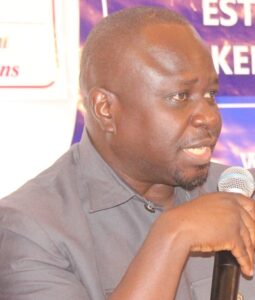The Ghana Statistical Service (GSS), will in October 2023 conduct the country’s first all-encompassing business census to generate comprehensive data on all businesses and their characteristics.
Unlike previous censuses that focused on specific sectors of the Ghanaian economy, the 2023 edition would cover all formal and informal Micro, Small and Medium-sized Enterprises (MSMEs) across the country.
The outcome of the GH¢160 million funded census would be ready by the first quarter of 2024.
It would be preceded by trainings for enumerators and other census officials, as well as stakeholder engagements.
Speaking at a Stakeholders’ Consultative Meeting on Wednesday in Accra, the Government Statistician, Professor Samuel Kobina Annim, said that data from the census would help policymakers offer the right support for businesses to engender national transformation.
“The Ghana Statistical Service is coming in to help Ghana with the right data, not only to help governments but more importantly, to help businesses to be more resilient,” he said.
He added that the economic census would provide information on the number of businesses that employed most people, thereby, make the government come up with strategic programs to increase their capacities to do more and lessen the unemployment burden in the country.
Prof Annim explained that the meeting was to ensure that the GSS built on existing relationship with the business community and make various business associations ambassadors to communicate the needed message about the survey to all people.
In an interview with the Ghana News Agency, Mr Anthony Krakah, the Head of Industrial Statistics and National IBES Coordinator, said the GSS had for the past 100 years conducted economic censuses, but it had become necessary for the existing data to be updated.
“We did the last one in 2013, and we need to understand what’s happening to the distribution or characteristics of businesses after 10 years on, to ensure that young businesses can grow and live long,” he said.
“There were a lot of informal sector businesses that the previous Economic Census did not focus on. This time, we want to go all out and make sure that every economic activity that we can collect data on are captured to get a reflection of what businesses look like in a typical developing country like Ghana,” he added.
The IBES Coordinator explained that the data generated during the census was for statistical purposes, and not purposely for tax collection.
Mr Krakah called on business associations to support the Statistical Service in the data collection by educating their members on the essence of the census prior to the due date.
Mr Samuel Amegayibor, the Executive Secretary of the Ghana Real Estate Development Association, told GNA that the census would help provide accurate data on businesses so that appropriate strategies and systems would be built to grow them sustainably, especially during pandemics.
He encouraged businesses to contribute to the success of the census by ensuring that data from the survey was credible and solid through the provision of the right information to the Statistical Service.
He also asked the Service to make the questionnaire simple especially to informal businesses to enable them to participate in the exercise.
During an interactive session, informal sector business leaders, including market queens and spare part dealers asked the Service to make them an integral part in their education and publicity campaigns.
That, they said, would make their members easily understand and buy into the exercise and volunteer information for the success of the census.
They pledged to educate their members using local languages, including Twi, Ga, Hausa and Ewe through their public address systems at their market places and personal engagements.
In 1926, the economic census focused on industry and distributive sectors, while that of 1987 focused on industry, likewise 2003, while that of 2003 excluded businesses not in structures and household businesses.
During the last census in 2013, there were 590,033 micro,117,329 small, 9,333 medium and 2,593 large businesses in the country.
The expanded 2023 IBES will cover business under sheds, those in open spaces but at fix locations, mobile and virtual establishments.
It would also generate data that would link business and population registers, collect GPS coordinates, with additional information on digital finance and environmental responsiveness.
Source: GNA/ ghanabusinessnews.com

